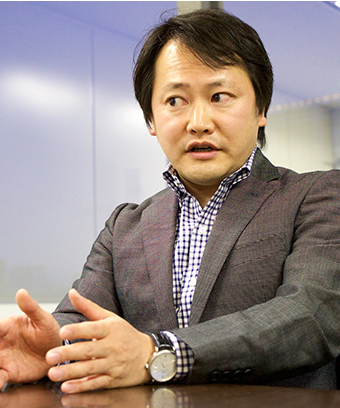Director
HITOSHI GOTO
- TOP
- Consultants
- Director HITOSHI GOTO

Director
HITOSHI GOTO
Certifications
U.S.CPA
The Official Business Skill Testin Bookkeeping 2nd Grade
I believe that what is demanded of consultants is to draw out what customers "really want to do" and to make that a reality.
My job includes planning system architectures geared mainly toward the IT planning offices of manufacturers and IT services-related companies, as well as actually deploying the systems. While I do have new clients, I have done business with the majority of my clients for a long time.
Even though the job of a consultant is to bring the demands of the customer to fruition, I believe that the job is not simply just fulfilling what the customer says they want to do, but rather drawing out the underlying essence of what the customer really wants at that moment in time and fulfilling that.
For instance, I formerly served as a resident consultant for about five years to the IT planning office of a Japanese domestic manufacturer, and I took even my duties outside of consulting seriously. Specifically, I attended the client's morning meetings, sang along to the company's anthem, and developed relationships with the staff even outside of the IT area, both professionally and privately. While this naturally made me well-informed about the client's system and work process, it also allowed me to plan on top of being intimately familiar with the corporate culture and the preferences of the stakeholders.
Being on-site for a long period of time allows me to get a sense of what that company should do next and the optimal timing for system deployment, and gives me a sense of what management is looking for from the IT department. This is precisely the notion of "what the client wants to do at this moment" that lies beyond the initial request of what the client says they want to do.
I, of course, am a system deployment professional, and I offer "what is really wanted" after developing a true understanding of the positions of the individuals on-site.
The same is true overseas as well. I had the opportunity to be sent to the United States for about two years and, as expected, I acted as if I were an employee at the client company rather than just working as a consultant, having meals with local staff members, participating in events, and more. Through these experiences, I was able to truly develop an understanding of what both the local staff and the staff who were on assignment from Japan were demanding, enabling me to offer "what each side truly wanted at that moment".
The strength of EBSS is that it does not give up.

I think there are many people in EBSS with a strong sense of responsibility. Let me venture to say that it seems as if a crucial part of what EBSS has built up would all fall apart if we were to give up even once. The way that we are so obstinate in doing what we do may perhaps be something akin to pride.
One project I remember well even to this day was in 2011 the year of the Great East Japan Earthquake. There was a major flood in Thailand that year and the EBSS team including myself were frequently visiting Thailand on a certain project. Immediately before the system about to go live, the waters were encroaching on Bangkok where the factory was located. Perhaps it was no situation in which the project should have continued, but we hung in to the last minute, launched the system, and flew back to Japan. The local staff members were extremely grateful to us, saying "We really appreciate you deploying the system even though Japan, too, was in crisis." Although that was enough, when we went to Thailand a year later on another project, the local members still remembered us and held a small party for us at their office. I really thought, "I'm glad we did that!" when they told us thank you for that incident.

